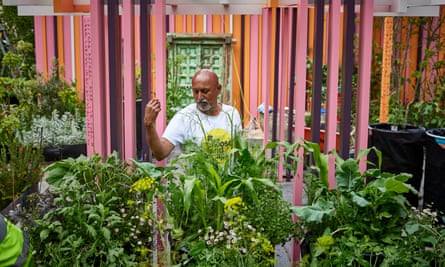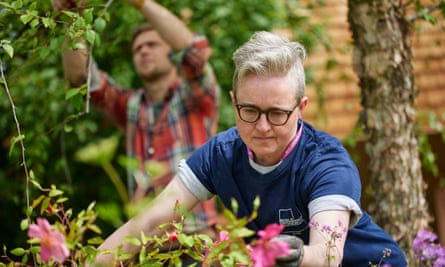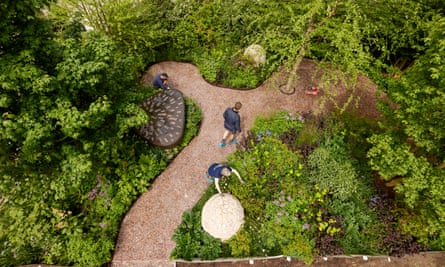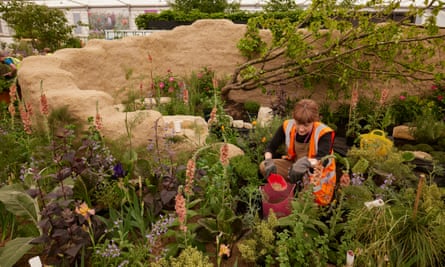
Chelsea flower show has long been a staple of the society calendar, with celebrities and royals making an appearance among the peonies and roses.
However, this year, the Royal Horticultural Society is trying to make the show – and horticulture – more inclusive, by putting on special events for children, and encouraging the creation of gardens with an accessibility theme.
For the first time in its 110-year history, a picnic for children will take place at the show, with attendees coming from 10 schools in the most disadvantaged areas of London. After the event finishes, some of the show gardens will be transported into the grounds of schools that lack green space, in the hope it sparks a love of the outdoors in children who otherwise have little access to nature.
Chelsea will also be hosting its first wedding, between the garden designer Manoj Malde and his partner, Clive Gillmor. They plan to tie the knot on Monday in the garden Malde designed for the show, which has a theme of unity and diversity.
Malde said: “It’s really important that people know the RHS isn’t just about their shows and gardens, it also does a lot in the community – then people will begin to understand that it’s not elitist.
“How on earth is anyone going to accuse the RHS of being elitist when they are going to have the first RHS Chelsea wedding between a gay Indian man and a gay Irish man? [The garden designer] James Alexander Sinclair is going to be the celebrant. I’m thrilled. We’ve had the outfits made in India and I’ve asked all the ladies in my family to wear saris, so it’ll be really nice to have that tradition as well.”
Malde’s garden will celebrate his heritage, with a colour scheme of orange and pink, marigolds used in Hindu worship, and colourful spices set out on a table alongside small oil lamps used at festivals and religious ceremonies. The garden will also feature Asian fruit and vegetables.
In the Great Pavilion there will be a display celebrating female gardeners; for the first time in the show’s history more designers are female than male.
The RHS’s director of shows and gardens, Helena Pettit, said: “It’s so important to us that gardening is accessible to everyone, so we are really pleased that this is such a strong theme running throughout this year’s show.
“It’s an ongoing project which will always need further work, but we have made a concerted effort to make sure RHS Chelsea flower show this year is demonstrably open.”

Many of the gardens have themes of accessibility, including that of the charity Horatio’s Garden, which is designed to be wheelchair accessible. The charity creates accessible and sustainable gardens in spinal centres and this particular garden will be moved after the show to the Princess Royal spinal injuries centre in Sheffield.

The Choose Love Garden is inspired by refugee migration routes across Europe and the concept of desire lines – paths created by usage where no formal routes exist. It will grow crops and herbs eaten by asylum seeker communities in the UK. The garden will later be relocated to Good Food Matters in Croydon, a community scheme that provides marginalised groups space and support to grow and cook their own food.

The School Food Matters garden is designed with children in mind. Paths will be child-sized, allowing them to create their own imagined worlds as they meander past plants and scramble over boulders surrounded by bright flowers. It is also full of crops, including radishes and beans, and it will inspire the creation of two gardens by the gardeners at schools in London and Liverpool.
The Memoria & GreenAcres Transcendence Garden is designed for bereaved people, with tall trees and flowing water aimed at creating a sense of peace.
The designers Amelia Bouquet and Emilie Bausager are making their RHS Chelsea debut with the Platform Garden. Inspired by unused overground station platforms in London, the garden, which features concrete bins as planters and novel ways to harvest rainwater, will eventually be installed at a nearby station.
Pettit said:“A requirement this year is that every garden lives on after the show, whether it be in a hospital, a school or a community space, so thousands of people will benefit from these gardens for years to come. For too long, gardening has not been as open as it should be to people from all walks of life, and we need to tackle this at all levels.”



